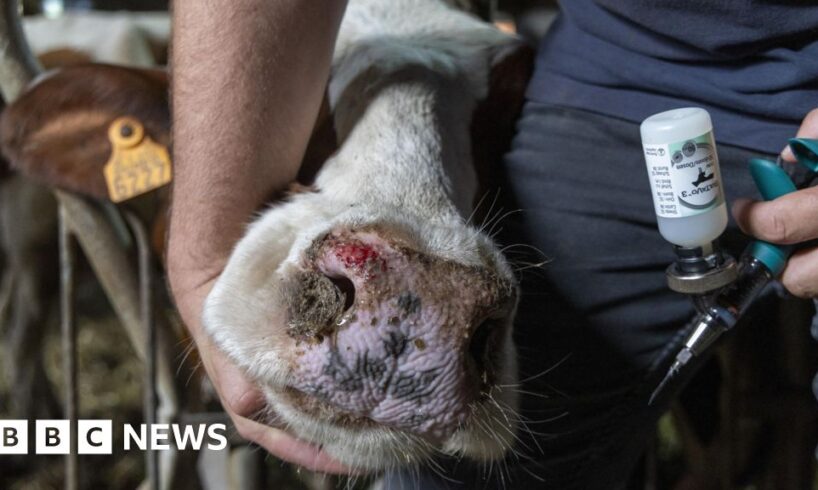
Steffan Messenger
Environment correspondent, BBC Wales News
Getty Images
Vets are concerned about a low uptake of the bluetongue vaccines in Wales so far
Vaccine scepticism and misinformation is affecting uptake of bluetongue jabs needed to protect farm animals, senior vets have warned.
Figures shared with the BBC suggest fewer than 1% of Wales’ eight million sheep have been vaccinated so far against the potentially fatal virus.
Movement of livestock from England into Wales has been restricted in recent weeks, with new cases of the disease subsequently found near the border in Herefordshire.
Vets fear the impact could be “catastrophic” should bluetongue take hold in Wales, where livestock farms dominate the agricultural landscape.
Spread by midges, bluetongue presents no threat to food safety or human health, but can have serious consequences for ruminant livestock like sheep and cattle.
Veterinary and farming organisations are using this week’s Royal Welsh Agricultural Show in Llanelwedd, Powys, to push for greater uptake of available vaccines.
The show – one of Europe’s biggest agricultural events – has banned sheep and cattle from England and Scotland this year, as part of efforts to try and keep the virus out of Wales for as long as possible.
Welsh government restrictions also limit the movement of sheep across the border without a negative test, while cattle must be fully vaccinated.
The Pirbright Institute
Infected culicoides midges blown over from northern Europe can infect livestock with one bite
The latest bluetongue outbreak began in the Netherlands in 2023, where tens of thousands of sheep have died.
Midges blown over from the continent began infecting livestock in the south east of England too.
Movement restrictions helped slow the virus’ spread, but as of 1 July the whole of England was classed as a restricted zone for bluetongue.
Warmer temperatures mean the midge population is now active and the first cases this year were confirmed on 11 July after pre-movement tests on two cattle in Herefordshire.
It has since been revealed these animals were due to be sent on to Wales.
Chris Jackson
Cattle and sheep from England and Scotland are barred from this year’s Royal Welsh Agricultural Show due to bluetongue fears
“It’s been seen as something that’s a long way away – but now there’s a real possibility that it could get into Wales,” warned Phil Thomas, of the Wales Veterinary Science Centre (WVSC).
“There’s been a lot of misinformation, a lot of downplaying of the disease and I think post-Covid there’s also a lot of vaccine scepticism out there,” he added.
The fact the virus had arrived in less livestock dense parts of the UK to begin with had helped limit the spread, he said.
But monitoring of affected farms in the south east of England had revealed worrying implications should the disease reach the UK’s sheep and cattle farming heartlands.
A recent WVSC webinar for Welsh vets heard of farms in Norfolk experiencing long term fertility issues in herds and flocks which had been infected.
“There was a sheep farm where 30% of their animals were sick, around 5% died but surviving rams were infertile and the ewes were giving birth to deformed lambs,” Mr Thomas said.
Another example involved a suckler herd of 120 cows where fewer than 60 calves were born the year after infection.
“It’s a big economic loss, and that’s a lot of dead stock if it gets into the stock-dense areas that we have in Wales and the borders,” he added.
Sara Pedersen
Farm vet Sara Pedersen warned bluetongue could have a “catastrophic” impact on Wales
An industry wide social media campaign has been launched in recent weeks, with Welsh vets and farmers making an appeal for others to consider vaccinating their livestock.
“There’s been real concern over lack of uptake of the vaccine,” explained farm vet Sara Pedersen and member of the Wales Animal Health and Welfare Framework group.
Vets were coming up against “quite a bit of misinformation” such as people saying “it’s harmless and it won’t reach Wales”, she said.
“We really felt we needed to cut through that and make the most of the opportunity of keeping it out for as long as possible.
“When it comes it could have catastrophic effects,” she warned.
How many animals have been vaccinated?
The latest figures shared with the BBC showed the vaccine had been prescribed by vets for 154,260 animals in Wales, including 103,970 cattle, 48,904 sheep, 200 camelids (llamas and alpacas) and 1,186 goats.
Animal keepers themselves have reported vaccination of 79,694 animals, including 48,403 cattle, 30,898 sheep, and 393 others, including camelids and goats.
Farmers at Llandovery livestock market said they were worried about the cost of vaccination.
At Llandovery livestock market in Carmarthenshire, none of the farmers BBC Wales spoke to had vaccinated their animals so far.
“I’m right down in west Wales so haven’t thought of vaccinating yet,” explained Alan Jones.
“But I am keeping an eye on it and reading the news all the time.”
“We’re lucky that bluetongue hasn’t affected this area yet,” added Gruff Jones, who was worried about how much he would have to spend on vaccination.
“There are so many costs involved in farming now with fertiliser and feed and everything – add that on and there won’t be any profit at all,” he said.
Kevin Page felt the Welsh government should offer to pay towards the costs of the jabs.
“There should be more help for farmers to vaccinate their sheep,” he said.
Jabs cost between £2.50 and £3 per sheep and between £5 and £6 for cattle.
Helen Roberts of the National Sheep Association (NSA) in Wales said the organisation was urging its members to consider vaccinating their flocks.
“Even if it ends up that there are not many outbreaks this year, you’re still putting in protection for next year – it’s well worth doing,” she said.
She also called for research into whether the vaccines go further than alleviating symptoms in sheep and prevent viremia – circulation of the virus in the blood – to be fast-tracked.
This might allow for the prospect of an easing of cross-border movement restrictions for vaccinated sheep.
“I’m hoping that information does come through sooner rather than later,” she said, adding it would further incentivise uptake of the jabs.
The NSA is asking the Welsh government to set out a plan for how it intends to deal with the disruption to trade along the border as a result of the restrictions.
“It’s coming into peak sales time now with breeding rams and ewes, we need an announcement soon,” Ms Roberts said.
Deputy first minister Huw Irranca-Davies said the Welsh government was doing its “very best to hold the disease back”, buying time for farmers to vaccinate their animals.
But he warned “the wolf is at our door”.
He said he was being updated daily by officials and Wales’ chief veterinary officer and the Welsh government would keep movement restrictions under review throughout the summer.
“But I just want to say very frankly and honestly that every time we make an adjustment it increases cumulatively the risk of bluetongue incursion into Wales,” he said.





